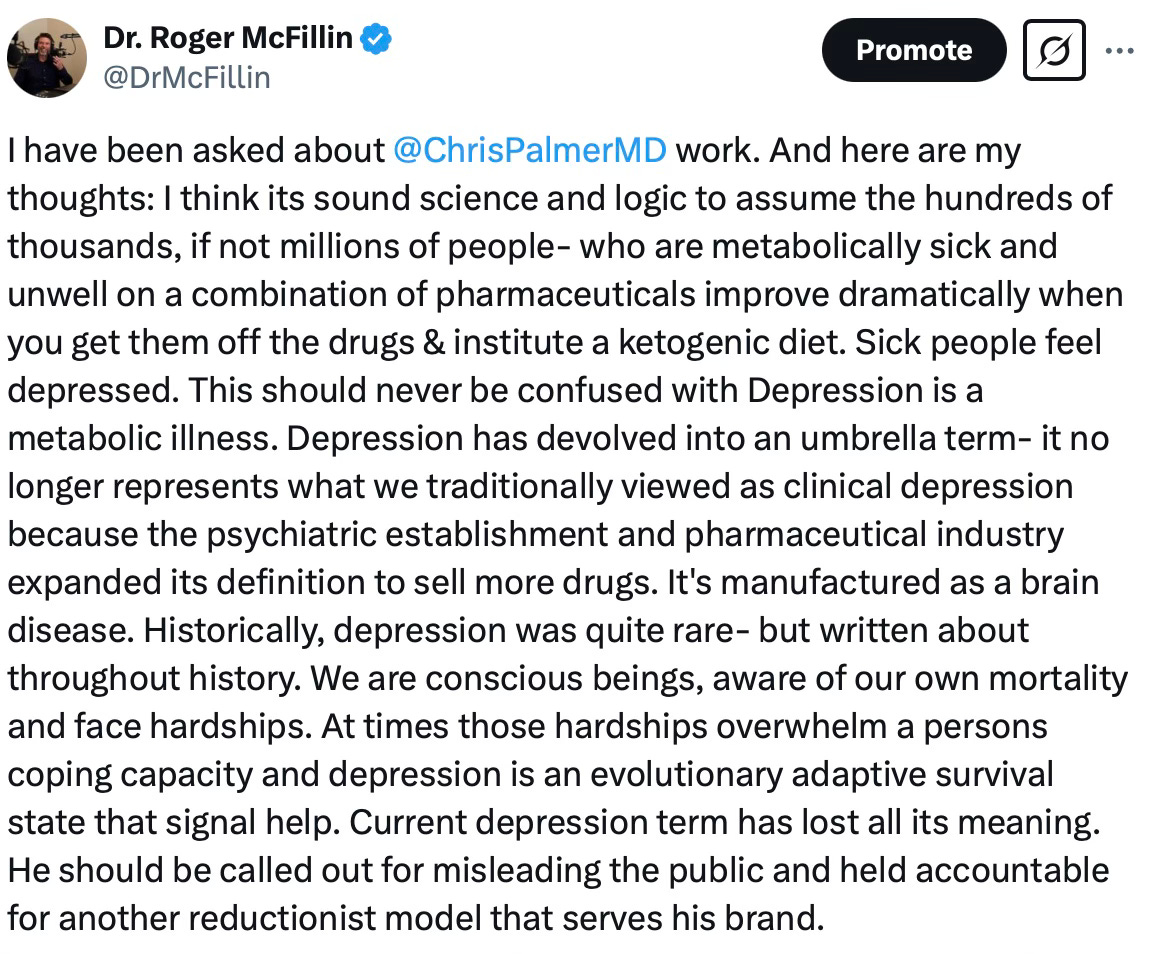Scientists Discover When Humans Stop Poisoning Themselves They Feel Better
Is the keto diet a revolutionary cure for mental illness or a dangerous oversimplification?
Recently, a new client—let's call her Lisa—came to my office after nearly two decades of psychiatric treatment. At 43, Lisa had been labeled with "treatment-resistant depression" by multiple psychiatrists. Her medical chart read like a pharmaceutical catalog: she'd cycled through eleven different antidepressants, mood stabilizers, and antipsychotics over the years. She'd been hospitalized three times for suicidal ideation. Meanwhile, her physical health had steadily declined—she'd developed type 2 diabetes, gained over 80 pounds, and struggled with chronic fatigue.
What her extensive medical records mentioned only in passing was the sexual assault she'd experienced at 17. Her PTSD symptoms had never been adequately addressed, buried under layers of medication adjustments and diagnostic labels. When we began working together, it became clear that before we could even begin processing her trauma, we needed to address her physical health crisis—one largely induced by the very medications prescribed to help her and a steady diet of processed food.
Three months into a ketogenic diet approach (alongside careful medication reduction under the care of a nurse practitioner), Lisa's blood sugar stabilized, she lost 22 pounds, and her energy levels improved dramatically. More surprisingly to her: her depressive symptoms began lifting in ways none of her previous treatments had accomplished. For the first time, she had the emotional bandwidth to begin addressing her long-buried trauma.
Let's be honest about what we're facing in America: a chronic disease epidemic where processed foods, sedentary lifestyles, and expanding waistlines have become the norm. Many of my clients are juggling multiple prescriptions before they even reach my office. And here's an uncomfortable truth we don't discuss enough in mental health circles—many of the “medications” prescribed actually induce the very metabolic dysfunction that might be contributing to psychological suffering in the first place. It's a vicious cycle I see daily.
So you bet I'm enthusiastic about interventions like the ketogenic diet, especially for folks battling both mental health challenges and metabolic illness. The connections are too significant to ignore. But here's where I pump the brakes a little—when we start reducing complex conditions like Lisa's “depression” to simply "metabolic illness," we're missing crucial pieces of the human puzzle. And that's what I want to unpack today.
Category Errors and Misleading People
In my training to become a clinical psychologist, they taught me this wild concept: sometimes when a person is feeling terrible, it's because something in their body is actually, physically wrong… and I don’t mean some mysterious chemical imbalance. Shocking, I know! My degree came from an Osteopathic medical school where they had this radical idea that the mind and body might—just might—be connected. Revolutionary stuff like stress and illness are connected.
However, when somebody wandered into my office complaining they couldn't get out of bed and life felt meaningless, we were trained to consider these could be a result of an undiagnosed medical condition. We would refer them for a medical workup, check thyroid function, screen for infections, review medications, and assess nutritional status before concluding they just needed to process childhood trauma or pop a Prozac.
Fast forward to 2025, in our TikTok-driven mental healthcare landscape, we've streamlined the whole tedious process down to a 15-minute Zoom call and an SSRI prescription. Much more efficient!
Because here's the thing—if someone's thyroid is operating at the speed of a three-toed sloth, no amount of discussing their relationship with their mother is going to fix it. If Lyme disease is throwing a rave in your nervous system, cognitive behavioral therapy treatment for depression will be more or less a fruitless endeavor.
From a diagnostic standpoint, we'd call this "depressed mood associated with a medical condition." But modern psychiatry, in its infinite wisdom, often skips this tedious medical investigation in favor of its favorite pastime: diagnosing discrete brain conditions treatable with their magic pills. It's just so much cleaner that way! Why bother with messy investigations into metabolic disorders when you can slap on a label and write a prescription?
So depression becomes this massive umbrella term covering everything from "your pancreas is screaming for help" to "existential dread on a Tuesday afternoon." And this would be fine if we were honest about it.
But we're not.
Instead, we've sold the public this narrative that depression is primarily a discrete brain illness requiring pharmaceutical intervention. The exact pharmaceuticals, by the way, that often create the very metabolic chaos they're supposedly addressing now with keto.
But let's remember something crucial here: depression as condition did not evolve alongside Doritos and Mountain Dew. Depression existed long before our chronic disease epidemic. Aristotle wasn't writing about melancholy because his blood glucose was spiking after too many amphoras of honey wine.
We are, unfortunately for all of us, conscious beings—cursed with awareness of our mortality and blessed with the ability to replay our most embarrassing moments at 3 AM on loop. We worry about our children, our jobs, and whether that weird text we sent was misinterpreted. We exist amongst wars, poverty, disease and childhood cancer. We're the only creatures on earth who can time-travel through regret and anxiety while physically remaining in the present.
Life is difficult.
Will going into ketosis help someone who's metabolically sick? Absolutely—pass the bacon and throw away the bread. But will it be the miracle cure for the person who's been told they're "a useless piece of shit" since age four and now, shockingly, struggles with confidence and self-worth? Will eliminating carbs eliminate the voice in their head that sounds suspiciously like their alcoholic father?
Somehow, I doubt ketones are that powerful. If they were, philosophers would have solved suffering millennia ago with a high-fat diet. "Behold," Plato would have written, "I have eliminated carbs and thus have achieved a state of euphoric bliss and peace of mind".
If the original problem is diabetes, heart disease, or nutritional deficiencies, then yes—let's diagnose and treat it properly. But let's not pretend that switching from bread to butter will repair the complex psychological architecture that makes us human. Some suffering comes from glucose levels; some comes from being conscious in an unpredictable world where hearts get broken and dreams get crushed, carbs or no carbs.
If Someone is Poisoned, Remove the Poison
Let's state the blindingly obvious: psychiatric drugs have not been evaluated for long-term use. Not even close. Yet we're handing them out like candy at a parade, often for decades of continuous use. These compounds are interfering with nature—with biological systems so intricate and sophisticated that our brightest minds have barely scratched the surface of understanding them. The human body is nothing short of miraculous, having evolved over millennia into a self-regulating marvel. And we think tinkering with its delicate neurotransmitter balance using blunt pharmaceutical instruments is somehow consequence-free?
What we're doing is dangerous. These drugs mask legitimate symptoms that reveal critical information needed for us to address the core problems. They're chemical straightjackets that silence the body's distress signals while the underlying damage continues unabated. It's like removing the batteries from a smoke detector while your house burns down around you. Problem solved!
Meanwhile, we're swimming in a toxic soup of our own making. Processed foods stuffed with chemicals never found in nature. Pesticides coating our produce. Microplastics in our water. Flame retardants in our furniture. Endocrine disruptors in our personal care products. Heavy metals accumulating in our tissues. Our bodies are being bombarded by compounds our ancestors never encountered, and we wonder why we're getting sicker?
Add to this our increasingly sedentary lifestyles, chronic sleep deprivation, isolation from community, disconnection from nature, and constant exposure to artificial light and electromagnetic radiation. The ever-expanding vaccine schedule introduces more compounds directly into the bloodstream, triggering immune responses we haven't evaluated long-term across populations. We're conducting a massive uncontrolled experiment on ourselves, with more variables than we can possibly track.
Here's the revolutionary idea that apparently requires a medical degree to comprehend: if someone is poisoned and feels like shit... removing the poison will make them feel better.
The absurdity reaches its peak when we step back and see the full picture: We create chemical compounds in factories. We consume these unnatural substances regularly. When they inevitably make us sick, we label it as a new disease. Then, when we remove the poison and people get better, we claim we've "cured" that disease. It's like hitting yourself with a hammer, calling the resulting pain "Hammer Impact Syndrome (HIS)," then stopping the hammering and declaring you've discovered a cure for HIS.
The ketogenic diet works for many people because it eliminates many of these poisons. It removes the ultra-processed carbohydrates, the seed oils, the food additives, the sugar that feeds inflammatory processes. It forces the body to return to its evolutionary preference for fat metabolism. Of course people feel better! They've stopped poisoning themselves.
But let's be crystal clear: this isn't "curing mental illness" in the way it's being marketed. This is removing the chemicals that were making you sick in the first place. There's a fundamental difference, and that difference matters when we're talking about human suffering and how to address it.
If your "depression" disappears when you stop eating garbage, you weren't suffering from a clinical depression in the traditional sense. You were being poisoned!
The Dangers of Biological Reductionism
Remember Lisa from our opening? Let's check in on her keto-fueled redemption arc. Her blood sugar stabilized, energy improved, and she dropped some weight. Magnificent! Her inflammation markers declined, brain fog lifted, and she could finally string together coherent thoughts without the metabolic chaos. All of this triggered a cascade of positives: she could exercise again, which improved her sleep, which further stabilized her mood. Perhaps most significantly, with careful medical supervision, she was able to safely taper off four of her five psychiatric medications—drugs that had been causing metabolic havoc for years with questionable benefit. She's now on a slow, cautious taper of the fifth one, potentially freeing herself completely from pharmaceuticals that were once declared "lifelong necessities." The biochemical improvements were real, valuable, and freed her from a pharmaceutical dependency that had been marketed as lifelong.
But here's the inconvenient truth that the metabolic messiahs don't put in their Instagram captions: Lisa still woke up in cold sweats at 3 AM when a car door slammed. She still flinched when men raised their voices. She still assumed every person who showed interest in her wanted something sinister. She still had exactly zero close friends because trust felt like handing someone a loaded gun pointed at her heart.
Weird, right? It's almost like being sexually assaulted at 17 and having that trauma dismissed for decades might leave psychological wounds that bacon and avocados can't heal. Shocking!
If Lisa had bought fully into the "mental illness is just metabolic disease" narrative, what happens when the keto diet doesn't fix everything? When the improved biomarkers don't magically erase two decades of adaptive but now-problematic survival responses? She'd be vulnerable to the same trap that's ensnared millions who've gone the psychiatric drug route: hopelessness. The crushing belief that she must be fundamentally broken. The identity of being "mentally ill" as an immutable state of being.
Instead, Lisa learned something revolutionary: her reactions made perfect sense given her history. Her brain wasn't "broken"—it had adapted precisely as it should to protect her from perceived threats. She wasn't experiencing a ketone deficiency; she was experiencing the natural consequences of having her sense of safety and autonomy violently stripped away at a formative age. The hypervigilance, the distrust, the isolation—these weren't symptoms of a disease to be cured; they were psychological adaptations that once served a purpose but now limited her life.
She had to face that reality. Process those memories. Build new pathways of trust and connection. Learn to distinguish between past threats and present safety. Develop an actual self beyond "survivor." No diet on earth accomplishes this psychological work.
And yet, look at psychiatry—desperately clinging to biological reductionism like it's the last helicopter out of a war zone. The "chemical imbalance" theory has been thoroughly debunked? No problem! Let's rebrand to "metabolic disorder" and keep our medical legitimacy intact! It's the same playbook with updated terminology: reduce all human suffering to biology, prescribe treatments that target biology, and when those treatments fail, blame the patient's biology for being particularly stubborn.
Why this pathological need to deny the psyche? Why the allergic reaction to acknowledging the mind as something more than just the mechanical operations of the brain? Why the absolute terror of engaging with the human soul?
Perhaps because biology is measurable, controllable, and—most importantly—marketable. You can't patent human connection. You can't sell healing relationships in blister packs. You can't mass-produce meaning and purpose. There's no scalable business model for recognizing natural resilience.
And most damning of all: the biological model absolves our society of responsibility. If depression is just faulty brain chemistry or rogue inflammation markers, we don't have to examine toxic work cultures, crumbling communities, meaningless jobs, economic precarity, social media's assault on self-worth, or the spiritual wasteland of consumer capitalism. How convenient! We can ignore that we live in a world where women and children are sex trafficked, corrupt politicians start wars for profit, and new viruses emerge from labs directed by sociopaths with god complexes. The biological model isn't just scientifically reductive—it's the perfect distraction mechanism. Keep the population focused on their personal neurochemistry while the world burns. There's a genuine, vested interest in keeping you obsessed with your serotonin levels rather than questioning why you feel terrible in a terrible world.
The most insidious aspect of this biological reductionism is the underlying message: you should feel good all the time, and when you don't, something is wrong with your biology. Not with your circumstances. Not with your relationships. Not with the contradiction between your values and your actions. Not with the society demanding your conformity. Your biology.
What cosmic arrogance to pathologize the natural human response to an unnatural world! To medicalize appropriate sadness, justified anxiety, and necessary grief! To strip human suffering of its meaning and context, reducing it to mere chemical aberrations!
Keto might help your body. It might clear the metabolic fog. It might give you the energy to do the actual work of healing. But let's stop pretending that healing from trauma, finding meaning in suffering, or building a life worth living can be accomplished through macronutrient ratios alone.
The psyche exists. The soul matters. And pretending otherwise isn't just scientifically unfounded—it's dangerous.
I try to keep RADICALLY GENUINE as free as I can, but it takes quite a lot of work. If you find some value in my writing and podcast I very much appreciate the paid subscription. It really helps me continue putting time aside for these pieces. Thank you.











This post needs to be read and explained to every single human on the planet. It is brilliant and brilliantly written. Thank you!
Hot damn. Thank you for your voice, Dr. McFillin.